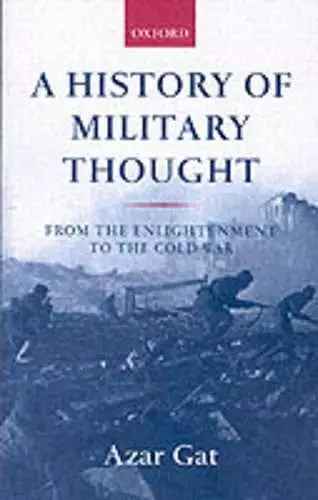A History of Military Thought
From the Enlightenment to the Cold War
Format:Paperback
Publisher:Oxford University Press
Published:8th Nov '01
Currently unavailable, and unfortunately no date known when it will be back

From the ideas of Clausewitz to contemporary doctrines of containment and cold war, this is a definitive history of modern military thought. A one-volume collection of Azar Gat's acclaimed trilogy, it traces the quest for a general theory of war from its origins in the Enlightenment. Beginning with a provocative critique of Clausewitz's classic work On War, the author unravels the endemic difficulties in Clausewitz's work that have baffled scholars for so long, clearly explaining the development of his ideas against the background of the Napoleonic revolution in war and the Romantic critique of the Enlightenment. He continues the story through the strategic ideas of the Prussian-German military school during the nineteenth century, the factors that shaped the 'cult of the offensive' in the French Army before the First World War, and the competing doctrines which dominated naval warfare during the ages of sail and steam. In the final part of the trilogy, he shows how theories of mechanized war emerged throughout the industrial world in the first decades of the twentieth century and explains why their leading exponents were associated with fascism. Drastically re-evaluating B.H. Liddell Hart's contribution to strategic theory, the author argues that in the wake of the trauma of the First World War, and in response to the Axis challenge, Liddell Hart developed the doctrine of containment and cold war long before the advent of nuclear weapons. He reveals Liddell Hart as a pioneer of the modern western liberal way in warfare which is still with us today.
Review from other book by this author 'brilliant synthesis of moden military and naval analysis...highly recommended.'The Historian
Azar Gat has certainly done much to rescue Liddell Hart from the clutches of his recent critics. His book, like its predecessors, is a formidable achievement./ Brian Holden Reid, TLS, 21/05/99.
`Gat presents a great deal of historical and theoretical material in a relatively brief compass.' Foreign Affairs
`but it is not on the military side of its university that Dr Gat operates, it is in the departments of history and political science ... And it is this which gives his work its depth and value ... he is above all a historian of ideas ... he has written a very good book ... The historiographical passages and bibliographical footnotes are rich and useful, the general-historical foundations of the work are admirably solid, and the exposition flows from cover to cover in a powerful and compelling stream.' Times Literary Supplement
'The present volume ... extends and amplifies the basic argument that Gat developed in his earlier book on The Origins of Miltary Thought from the Enlightenment to Clausewitz, by far the most frequently cited work in the notes to this one. His approach has the merit of simplicity, and those who found the first volume convincing will find little to complain about here.' Daniel Moran, United States Naval War College, The Journal of Military History
'In this most welcome sequel he extends his study to cover the whole of the period from the Napoleonic era to the First World War. A brief review can do scant justice to the quality of this book. Its erudition is matched by the clarity of its presentation and above all the originality of its concepts.' Michael Howard, War in History 1994
`Gat's book must be lauded for the attempt it makes to remedy one of the great omisssions in the historiography of strategic theory. An especially worthwhile result of Gat's approach is the fundamental criticisms it allows Gat to make of the popular interpretation of pre-First World War French miltary thought, ... the second important contribution of Gat's book is to show that the 19th-century European military had a coherent, convincing, and applicable view of war.' Security Studies
a thouroughly researched, felicitously composed ... work that ... makes a very important point and deserves close attention from students of military thought. * Harold R. Winton, The Journal of Military History, Vol.64, No.3. *
ISBN: 9780199247622
Dimensions: 217mm x 139mm x 46mm
Weight: 1368g
906 pages